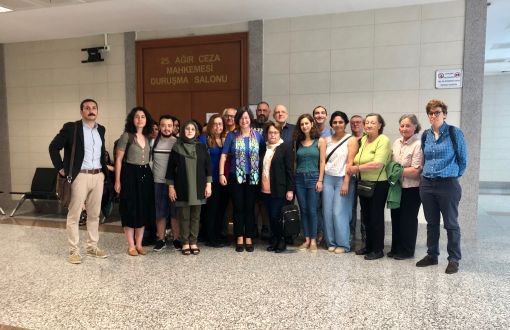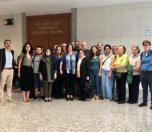* Photograph taken on the day when Altınay was sentenced to 25 months in prison
My friend, the Turkish scholar, Prof. Ayşe Gül Altınay, was sentenced to 25 months in prison for "knowingly and willingly aiding a terrorist organization as a non-member." Her crime: Signing a petition calling for an effort to find a solution that could end the extreme state violence unleashed against civilian population centers in largely Kurdish eastern Turkey.
Ayşe Gül Altınay is one of 742 academics who have stood trial as of June 12, 2019, in one of the "trials of academics" taking place in Turkey over the past 18 months. In January 2016, a petition signed by thousands of academics called publicly for an effort to find solutions that would end the unprecedented campaign directed by [President Recep Tayyip] Erdogan's government against regions in eastern Turkey populated chiefly by people from the Kurdish minority. Turkish authorities called the petition treasonous and commenced a witch hunt targeting its signatories, which intensified six months later after a failed coup attempt.
"I firmly believe that we all have new steps we can take towards healing the traumas that have been transmitted from one generation to the other, and to break out of the cycles of violence that we are living through," Altınay declared before the Heavy Penal Court in Istanbul on May 21.
"In terms of the cycle of violence that trauma studies alert us to, we live in a challenging, vulnerable geography. Yet, what we make of these past experiences of pain is up to us...
"Are we going to turn our pain into more violence, hate, pain and injustice, or into steps that multiply life, beauty, love, peace and justice? This is the main question that shapes my work and my life."
Multiple statements of support and solidarity from all over the world (including one from the Israeli-based group, Academia for Equality) have been crowding onto social media pages and into the mailboxes of leading officials of higher education in Turkey.
These reflect some of the singularity that so many friends and colleagues sense in Altınay, who is a highly respected scholar of anthropology, culture studies, memory theory and gender. She is a professor at Sabanci University in Istanbul, which has supported her throughout and recently promoted her to full professor, and Director of Sabanci's Gender and Women's Studies Center of Excellence (SU Gender).
My friendship with Ayşe covers almost two decades over which we have collaborated on a varied list of initiatives in the field of feminist activism and resistance to militarization and war. We met here in Israel once, at a conference scrutinizing the militarized control exercised in our respective countries over state educational systems. Our subsequent meetings mostly took place in Istanbul, Ayşe's city, which I learned to love partly through her experiences and knowledge of it. Along the way, we accompanied each other through various crises in a process that deepened our bonds of friendship and, gradually, I have learned to recognize the unique combination of tranquility and vitality with which Ayşe takes on extreme situations.
The petition which Ayşe Gül Altınay was charged for signing, leading to a sentence of two years and one month in prison, was published in January 2016 under the title "We will not be a party to this crime."
As described in a statement to the court made by Ayşe Erzan, another dear friend who is also one of those standing trial, this petition was, "a plea for the repudiation of the policies of force, in favor of 'seeking solutions for a lasting peace.'" It called for an end to the use of unbridled military force against cities and regions in eastern Turkey a majority of whose population is Kurdish. Erzan, an award-winning physicist retired from Istanbul Technical University, was a member of the Jury of Conscience of the 2005 World Tribunal on Iraq, on which I too was privileged to serve. As part of the Women's Initiative for Peace she was on a delegation that traveled to Cizre in 2015 to offer condolences.
Tried and sentenced to over a year in prison, Erzan stated in court that the petition she had signed protested "the imposition of highly controversial curfews, lasting for months on end in the Southeastern part of Turkey, [...] the deaths of more than a thousand people, ... the forced eviction of more than 150 thousand people from their homes in just Diyarbakir, and [steps that] created more than a million homeless in the whole the region."
The petition was first published with 1,128 signatures of academics. Shortly after it was first announced, it was presented to the Turkish parliament with twice the number of signatures from Turkey – 2,212 – and another 2,215 supporting signatures of academics from all over the world, along with support from a list of research and higher education institutions inside and outside of Turkey.
The call aroused immediate and resounding rage among leaders of Turkey's regime. Labelling the signatories "so-called intellectuals," President Erdogan labeled their call treason, catalyzing a witch hunt targeting the group that had meanwhile come to be known as "Academics for Peace." Begun in early 2016, persecution of those who had signed the petition took a sharp turn for the worse about half a year later, after a failed coup attempt in July 2016.
Some 400 signatories of the petition were fired from teaching posts, barred from working at educational institutions or anywhere else in the civil service. Some had their passports confiscated. These punitive steps occurred within the broader context of a purge of over 100 thousand employees from the civil service, including more than 5,000 academics. Most of those dismissed were accused of connections with the network headed by the exiled leader Fethullah Gulen whom authorities accused of orchestrating the attempted coup. But emergency laws activated following the coup served as a means of purging some of the petition signatories, lecturers and researchers who teach and express critical, independent thinking.
The ongoing "trials of academics" begun in December 2017 are a next phase in the steps to silence and exclude progressive professors, this time through the judicial system which has been subjected to a thorough purge itself. The charges in all these trials are the same, "aiding a terrorist organization," criminalizing the free expression of dissenting views in a move typical of anti-democratic regimes. Regardless of the uniform charges, however, petition signatories are being subjected to separate, individual legal procedures, whose differing rulings and sentences have different legal implications.
Despite the policy of separation and individualization and the heavy burden of resources demanded by these individualized trials, the academics standing trial and those around them – colleagues, students, activist groups, family members and friends and, in some infrequent cases, the heads of their employing institutions – have demonstrated striking levels of solidarity and mutual support. Among other things, activists make a point at showing up at each of the hundreds of court sessions, of documenting, compiling and publishing regular updates, of collecting statements to the court by the accused for publication and translation into multiple languages, of financially supporting people who have lost their livelihood (through an academic union), of publishing and distributing studies by unemployed scholars who continue their research outside of academic institutions.
Until mid-June this year, 742 petition signatories have been charged and tried, with sentences handed down to about 190. Many verdicts came with prison terms of 15 months. Some of the academics receiving these sentences conceded (or had no choice but conceding, each for her or his reasons) to waive their right to file an appeal, an option open only to those who sentenced to prison terms of less than two years. Waiving the right of appeal turns the prison term into a suspended sentence, effective for five years, during which similar "crimes" will result in immediate imprisonment and additional charges. This lightened sentence, then, also serves as a powerful silencing mechanism.
Some of those "found guilty," Ayşe Erzan among them, refrained from waiving their right of appeal and filed appeals with a higher court of appeals. The process of appeal may take many months. Ayşe Gül Altınay, whose sentence of two years and one month exceeds the limit for waiving the right of appeal, will also appeal her sentence.
Some voices in Turkey today are proposing that Erdogan's regime may be overreaching itself, even among its followers, due among other things to the cancellation of the opposition victory in recent municipal elections in Istanbul. There are some indications that outside pressure, particularly from Europe, might end up dissolving and cancelling the prison terms to which the petition signatories have been and are still being sentenced.
Meanwhile, the close of last year (December 2018) saw sudden increases in the prison terms announced, crossing the two-year limit and ruling out any waiver of the right of appeal.
Prof. Gencay Gürsoy, former Chair of the Turkish Medical Association (TTB) was sentenced to 27 months in prison. Professor Sebnem Korur Fincanci was sentenced to 30 months in prison.
One of the founding members of the Forensic Doctors' Association, Korur Fincanci played a major role in developing the United Nations standards of reference on investigating and documenting cases of torture, known as the Istanbul Protocol. She chairs the Human Rights Foundation and her sentence was extended based on "new evidence," introduced during the fourth hearing of her trial and citing press interviews she granted in that capacity, describing the situation in eastern Turkey. In addition, the court has ruled that her sentence is not to be deferred or reduced.
Yonca Demir, an expert on mathematical modelling and organic agriculture, was sentenced to 36 months, the longest prison term to date. Prof. (retired) Füsun Üstel who refused to waive her right of appeal and proceeded to appeal, was imprisoned on May 8 this year. She is the first of those sentenced whose prison term, of 1 year, 3 months, has been implemented.
In a recent facebook post commenting on her sentence, Ayşe Gül Altınay wrote: "Those who are adding layers of injustice to the existing layers of injustice have a big burden to carry, and a long way to go. Of course, we too have a lot to learn from this process, and we are! --- to better understand each other's pain, [...] to relax into the uncertainty and the unknown that life is about, to live every moment to its fullest, [...] to feel the light and the colors of our inner space even when the ground on which we step is changing, [...] we are learning to come together and transform this darkness." (RM/SD)
* Originally published in Hebrew on: Local Call, May 27, 2019; English translation by the author.
-
About Rela Mazali
Rela Mazali is a writer, an independent scholar and an activist from Israel whose hybrid-genre books meld research and creative prose. The focus of her activism is feminist opposition to militarization and small arms proliferation in Israel. Among the founders of the New Profile movement to demilitarize Israel's society and state, she also co-founded the small arms disarmament, gun control project, Gun Free Kitchen Tables (GFKT).









